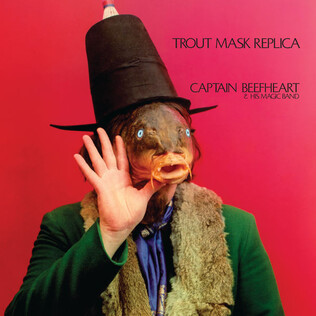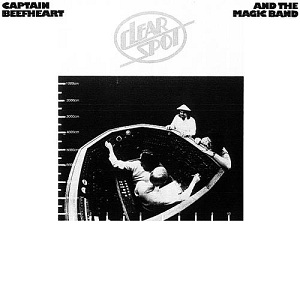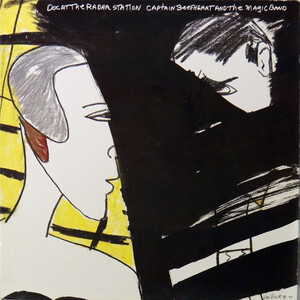
Don Van Vliet was an American singer, songwriter, multi-instrumentalist, and visual artist best known by the stage name Captain Beefheart. Conducting a rotating ensemble called Captain Beefheart and His Magic Band, known separately as "The Magic Band", he recorded 13 studio albums between 1964 and 1982. His music blended elements of blues, free jazz, rock, and avant-garde composition with idiosyncratic rhythms, absurdist wordplay, and his wide vocal range. Known for his enigmatic persona, Beefheart frequently constructed myths about his life and was known to exercise an almost dictatorial control over his supporting musicians. Although he achieved little commercial success, he sustained a cult following as a "highly significant" and "incalculable" influence on an array of new wave, punk, and experimental rock artists.

Trout Mask Replica is the third studio album by the American band Captain Beefheart and his Magic Band, released as a double album on June 16, 1969, by Straight Records. The music was composed by Captain Beefheart and arranged by drummer John "Drumbo" French. Combining elements of R&B, garage rock, and blues with free jazz, avant-garde approaches, and other genres of American music, the album is regarded as an important work of experimental music and art rock.

Gary Lucas is an American guitarist/songwriter/composer who was a member of Captain Beefheart's band. He formed the band Gods and Monsters in 1989.

Lick My Decals Off, Baby is the fourth studio album by American band Captain Beefheart and the Magic Band, released in December 1970 by Straight and Reprise Records. The follow-up to Trout Mask Replica (1969), it is regarded by some critics and listeners as superior, and was Van Vliet's favorite. Van Vliet said that the title was an encouragement to "get rid of the labels", and to evaluate things according to their merits rather than according to superficial labels.

Ice Cream for Crow is the twelfth studio album by Captain Beefheart and the Magic Band, released in September 1982. It is the last Don Van Vliet recorded before abruptly retiring from music to devote himself to a career as a painter. It spent two weeks in the UK album charts, reaching number 90, but failed to make the Billboard Top 200.

Bluejeans & Moonbeams is the ninth LP by Captain Beefheart and the Magic Band, originally released in 1974. Despite its uncharacteristically mainstream sound the album failed to chart.

The Spotlight Kid is the sixth studio album by Captain Beefheart. Released in 1972, it is the only album credited solely to Captain Beefheart rather than Captain Beefheart and his Magic Band, although every member features, and it is considered part of the band's repertoire. Often cited as one of the most accessible of Beefheart's albums, it is solidly founded in the blues but also uses instruments such as marimba and jingle bells that are not typical of that genre. The incarnation of the Magic Band on this album was Bill Harkleroad and Elliot Ingber, guitars; Mark Boston, bass; John French, drums; and Art Tripp, marimba. Session drummer Rhys Clark substituted for French on one track, "Glider".

Strictly Personal is the second album by Captain Beefheart and his Magic Band. It was originally released in October 1968 as the first album on the Blue Thumb Records label. It was released nearly a year after the band had taken to the studio to record the follow-up to 1967's Safe as Milk.

Safe as Milk is the debut studio album by American music group Captain Beefheart and his Magic Band, released in June 1967 by Buddah Records. A heavily blues-influenced work, the album features a 20-year-old Ry Cooder, who played guitar and wrote some of the arrangements.

Mirror Man is the fifth studio album by American band Captain Beefheart and his Magic Band, released in April 1971 by Buddah Records. It contains material that was recorded for the label in 1967 and originally intended for release as part of an abandoned project entitled It Comes to You in a Plain Brown Wrapper. Much of the material from this project was subsequently re-recorded and released through a different label as Strictly Personal (1968). The tapes from the original sessions, however, remained under the care of Buddah, who took four of the unissued tunes and released them as Mirror Man. The album sleeve features an erroneous claim that it had been "recorded one night in Los Angeles in 1965".

Clear Spot is the seventh studio album by Captain Beefheart and the Magic Band. It was originally released on LP in 1972 in a clear plastic sleeve.

Shiny Beast is the tenth studio album by American band Captain Beefheart and the Magic Band, released in October 1978 by Warner Bros. Records. The album emerged from production difficulties surrounding Bat Chain Puller, an album Captain Beefheart recorded for DiscReet and Virgin Records in 1976. DiscReet co-founders Herb Cohen and Frank Zappa feuded over the production of the album, because Cohen funded the production with Zappa's royalty checks. Captain Beefheart recorded a new album titled Shiny Beast due to Zappa withholding the master tapes of the original Bat Chain Puller album.

Doc at the Radar Station is the eleventh studio album by American band Captain Beefheart and the Magic Band, released in August 1980 by Virgin Records.

The Magic Band was the backing band of American singer, songwriter and multi-instrumentalist Captain Beefheart between 1967 and 1982. The rotating lineup featured dozens of performers, many of whom became known by nicknames given to them by Beefheart. They reformed in 2003, without Beefheart.

The Lost Episodes is a 1996 posthumous album by Frank Zappa which compiles previously unreleased material. Much of the material covered dates from early in his career, and as early as 1958, into the mid-1970s. Zappa had been working on these tracks in the years before his death in 1993.

Bat Chain Puller is the 13th studio album by Captain Beefheart, released on February 22, 2012. It was recorded in 1976 by DiscReet Records, who had intended to release it with Virgin Records as Captain Beefheart's tenth studio album. It was co-produced by Beefheart and Kerry McNab.
Gary "Magic" Marker was an American bass guitarist and recording engineer, best known for his involvement in various psychedelic rock bands of the 1960s.

The following is a list of official releases by American musician Captain Beefheart. With various line-ups of musicians called The Magic Band, Beefheart released a total of 13 studio albums recorded between 1967 and 1982, after which he left music to concentrate on a career in painting, as Don Van Vliet. His catalogue has since been augmented with extra releases including an EP and various compilations of live material, studio outtakes and greatest hits releases.
Moris Tepper, sometimes credited as Jeff Moris Tepper, is an American singer-songwriter, guitarist and artist.

I'm Going to Do What I Wanna Do is a live album from Captain Beefheart and the Magic Band. In support of the US release of his album Shiny Beast , Beefheart and the band undertook a promotional club tour. On Saturday 18 November 1978 they performed at My Father's Place in Roslyn, New York. My Father's Place was located under a motorway bridge, held about 200 people and the patrons sat at long tables and could dine whilst listening if they wished. The show was recorded and mixed directly to two-track tape. Rhino Records made the album available for download, after a limited release on CD.

















